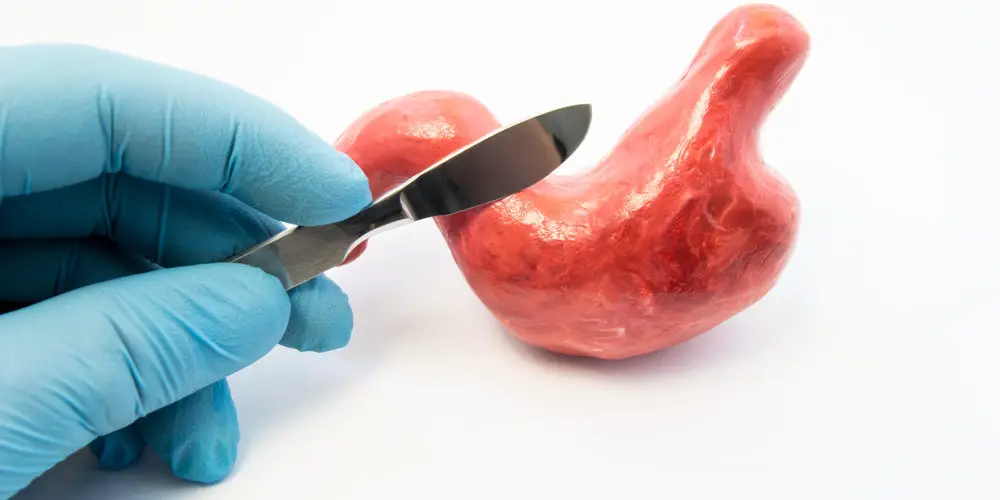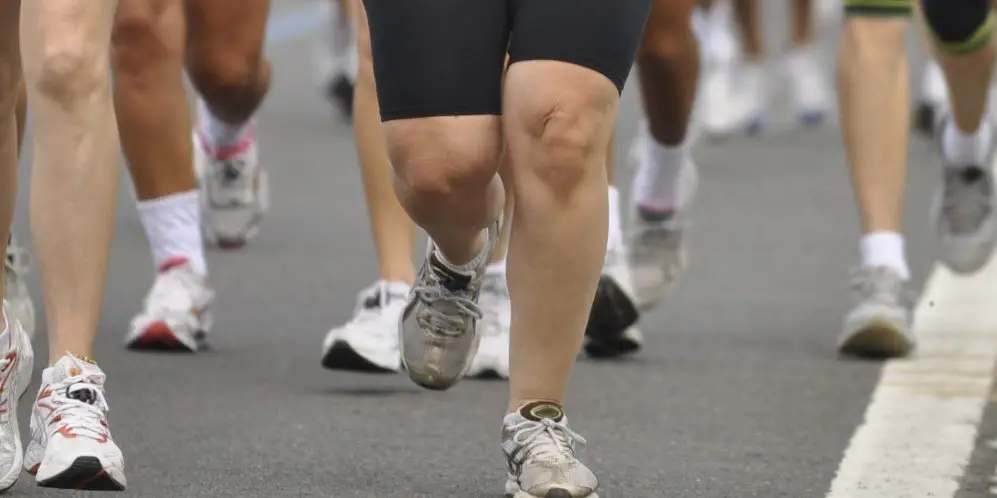By reducing the amount of food the stomach can hold, gastric sleeve surgery rapidly induces significant weight loss. This guide provides an overview of the procedure, detailing the dramatic results it provides and the commitment it requires from suitable candidates.
What Is Gastric Sleeve Surgery?
Gastric sleeve surgery, also known as a sleeve gastrectomy or laparoscopic sleeve gastrectomy, is a relatively new form of bariatric surgery performed to reduce the stomach to approximately 25% of its original size.
Designed to help obese patients lose weight rapidly and safely, it is performed laparoscopically through tiny incisions made in the abdomen with the help of a thin lighted tube.
Following gastric sleeve surgery, patients lose weight because they reach a feeling of satiety (feeling full) more rapidly due to the reduced size of the stomach. In addition, the body’s production of the hormone ghrelin, which stimulates appetite, is reduced by the procedure.
Gastric sleeve surgery has evolved as an alternative to other bariatric procedures, such as vertical banded gastroplasty (also known as stomach stapling). This procedure was abandoned due to poor long-term results; adverse effects included breakdown at the staple line or blockages forming at the ring placed to narrow the stomach. Sleeve gastrectomy has been designed to avoid these issues.
Initially, the gastric sleeve procedure was introduced as an intermediate step to reduce risk for very obese patients undergoing a gastric bypass or duodenal switch. The sleeve would be performed as the first step, then converted to a bypass or duodenal switch once the patient had lost sufficient weight. However, surgeons noticed that patients were already satisfied with the weight loss resulting from the gastric sleeve alone. In addition, many reported decreased feelings of hunger which further aided weight loss.
The complication rates linked to gastric sleeve surgery are low, and the rate of weight loss is as good, if not better than that of gastric bypass surgery. In addition, the surgery is swift and less complex than other forms of bariatric surgeries.
In recent years, sleeve gastrectomy has been commonly performed to encourage weight loss around the world. It is covered as an approved surgery for weight loss by nearly all major health insurance providers in the United States.

RELATED: Duodenal Switch Surgery Explained
Ideal Candidates for Gastric Sleeve Surgery
Not all overweight people qualify for gastric sleeve surgery. The best candidates have realistic expectations about what the surgery is capable of achieving, and are in a sound state of mental health. In addition, the following criteria must be fulfilled in order for a patient to be approved for surgery:
- Gastric sleeve surgery is indicated for morbidly obese individuals with a body mass index (BMI) of 40 or higher.
- In some cases, patients with a BMI of 35 or higher may also qualify. In order to be accepted for surgery they must usually suffer from one health issue related to obesity such as diabetes, hypertension, sleep apnea, asthma or joint pain.
- Those who undergo gastric sleeve surgery should be adults aged between 18 and 65.
- The patient must be able to withstand the rigors of surgery. Sleeve gastrectomy is a major procedure, and individuals with existing health complications could be exposed to a higher level of risk. Some initial weight loss prior to surgery can help to reduce the risk factor.
Gastric sleeve surgery also necessitates a range of dramatic lifestyle changes which patients can find stressful or difficult. It is essential to adopt a positive and healthy attitude towards food, exercise and the maintenance of good health and well-being in post-operative life. Most insurance companies therefore require patients to undergo a psychological consultation as part of the pre-surgical evaluation process.
» An experienced surgeon can help you determine if you could benefit from sleeve gastrectomy, or if another bariatric procedure would be more suitable for you. Our highly-experienced medical reviewers can help you find the best solution.
Benefits and Disadvantages of the Procedure
These are some of the main benefits of gastric sleeve surgery:
- It removes the part of the stomach that produces the hormone causing hunger (ghrelin), thus facilitating weight loss.
- The procedure restricts the amount of food the stomach can hold.
- It induces rapid and significant weight loss.
- There is evidence that gastric sleeve surgery can improve type 2 diabetes by improving blood glucose levels.
- The surgery requires a relatively short hospital stay of 2 days.
- There is no need to re-route the food stream as in gastric bypass surgery, or create a biliopancreatic division as in the case of duodenal switch surgery.
- All foods can usually be eaten, but in much smaller quantities.
- There is no need for ongoing adjustments which are often required with other gastric bypass procedures, such as gastric band surgery.
As with any surgical procedure, there are also some disadvantages:
- If a leak occurs along the staple line it can take months to resolve. This is one of the more serious possible complications that can arise from the procedure.
- There is little long-term data regarding the long-range efficacy of the surgery, since sleeve gastrectomy is a relatively new operation.
- There is a possibility that the sleeve will dilate over time, meaning weight loss will not be as efficient after ten years as it was in the first few years after surgery. This is common to all bariatric surgeries.
- Patients must be careful to ensure they receive adequate nutrition and take supplements if necessary as their portion size is significantly diminished.
Finding a Bariatric Surgeon
Being one of the more contemporary bariatric surgical procedures, there are a limited number of surgeons with expertise in sleeve gastrectomy.
Finding the right bariatric surgeon is one of the most important factors for success. Here are some of the most important points to consider:
1. Choose a local surgeon.
Weight loss surgery requires multiple appointments before and after surgery to monitor your progress. If at all possible, find a board-certified surgeon who lives within driving distance.
It’s much easier to maintain appointments, ask questions and have any concerns addressed if you place yourself under the care of a local surgeon. Patients who keep up their postoperative appointments are less likely to gain weight back by reverting to old habits.
2. Find a surgeon with whom you feel comfortable.
Gastric sleeve surgery requires ongoing contact with your surgeon and their medical team in the time leading up to your procedure. You will need to attend consultations where your BMI will be assessed along with your obesity risk factors and medical history, so that an optimal diet plan can be developed for you.
As you will be spending a significant amount of time with your surgeon, you should have a good rapport with him or her and feel comfortable asking questions or expressing concerns. Gastric sleeve surgery is a major surgery and it’s vital that you can trust your surgeon to listen to your needs and provide an excellent level of care.
3. Research your surgeon’s credentials.
If possible, choose a surgeon who specializes in bariatric surgery and has experience in sleeve gastrectomies.
Your surgeon should have board certification in general surgery and preferably be a fellow of the American Society for Metabolic and Bariatric Surgery (ASMBS). This fellowship ensures that all accredited doctors are certified by the American Board of Surgery (ABS) and have performed at least 25 bariatric surgeries in the past two years.
Feel free to ask your surgeon about their continuing education in the field of sleeve gastrectomies, which bariatric procedures they specialize in, and if you can meet with previous patients to ask them about their experiences.
4. Ask about the surgical center’s accredition.
The location where your gastric sleeve procedure is carried out is also significant. Ask your surgeon where they perform surgeries: ideally, it should be at a Metabolic and Bariatric Surgery Accreditation and Quality Improvement Program (MBSAQIP) Center of Excellence.
Hospitals that have earned Center of Excellence status observe the highest standards of safety and care, providing excellent outcomes and staff who have undergone specific training to care for bariatric patients.
You can locate Centers of Excellence at the Metabolic and Bariatric Surgery Accreditation and Quality Improvement Program (MBSAQIP) website.
How Much Does Gastric Sleeve Surgery Cost?
The cost of gastric sleeve surgery varies across different states in the United States, with prices ranging from $9,600 to $26,000. Pricing can be influenced by a range of factors:
- The cost of surgery set by the hospital in which the surgeon operates.
- The state where your surgery is carried out — surgery is often more expensive in cosmopolitan areas because of higher overheads.
- The experience of your surgeon — surgeons with more credentials and excellent reputations can charge more for their services than those with less experience.
Be aware that a low price does not necessarily indicate that your surgeon is less skilled than a higher-priced surgeon. Some surgeons prefer to offer their patients the lowest possible price because this attracts more patients. The most important factor governing your decision of who to choose should not be price but your relationship with the surgeon.
Postoperative Surgical Costs
Unlike gastric band surgery, gastric sleeve surgery does not entail many postoperative costs. Follow-up appointments with your surgeon are typically free, but there are still some costs to keep in mind:
- Nutritionist appointments are rarely included in the cost of surgery and need to be paid for out of pocket. They generally range from $50-$100 per visit.
- Post-operative antibiotics, pain relief and compression garments usually have to be paid for out of pocket.
- If complications do occur, they can be expensive. However, if your surgery was covered by insurance then any complications will be covered by insurance as well.
Does Insurance Cover Gastric Sleeve Surgery?
Gastric sleeve surgery was not covered by insurance in the past unless it was part of a staged bariatric procedure. However, due to an overwhelming body of evidence showing gastric sleeve surgery alone causes significant weight loss, most insurance companies have begun providing coverage for sleeve gastrectomies.
Nowadays, most health insurance providers cover the procedure, meaning the majority of the cost will be paid for. Even if the procedure is not covered by your insurer, you can most likely get them to pay for at least a portion of the cost.
» If you would like to undergo gastric sleeve surgery but are not covered by insurance, there are other financing options you can consider. Find out about CareCredit’s line of credit for healthcare-related expenses.
Preparing for the Procedure
Being mentally and physically prepared for your procedure is empowering. It places some control of the outcome of surgery in your hands, as proper preparation can dramatically affect the results you can expect to experience.
Preparation for surgery helps to:
- Reduce stress
- Save money
- Minimize the risk of complications
- Lose more weight
- Increase the likelihood that you will keep the weight off
In the months leading up to surgery, your surgeon will recommend you make some lifestyle changes that will help you to begin losing weight and adopt healthier behaviors to ensure the longevity of your results. Getting into the habit of healthier lifestyle choices before you undergo gastric sleeve surgery helps makes it easier to adjust in the postoperative phase when a healthy nutritious diet is imperative.
Some of the most important things you can do in the three months (or more) leading up to your surgery include:
1. Eat for health, and not for flavor or pleasure.
Once you have undergone gastric sleeve surgery, your stomach is reduced to 25% of its original size. This is great for weight loss but potentially detrimental to receiving adequate nutrition. You will need to practice eating small portions of nutritionally dense foods high in protein. Protein helps you to feel full for longer and also preserves muscle during the period of rapid weight loss following surgery.
Do not look at these dietary changes as a “diet”, but rather, as a positive new way of eating.
2. Eat slowly, chew each bite, and monitor your portion sizes.
The feeling of satiety or fullness takes 20-30 minutes to reach your brain. Eating slowly helps you to pick up on the feeling of fullness before you overeat.
3. Start taking multivitamins.
Bariatric patients do not absorb nutrients as easily because of changes to the digestive system and reduced food consumption. Start incorporating a multivitamin into your daily routine now.
4. Don’t drink with your meals.
After gastric sleeve surgery, you will need to wait an hour after meals before you can drink anything. Liquids move food through your stomach quicker, causing you to feel hungry sooner, which leads to weight gain. You will need to get in the habit of eating and drinking separately to avoid dehydration or undernourishment.
5. Give up soft drinks and drink water.
Drinking water helps you gain an early feeling of fullness, keeps you well-hydrated and flushes out your kidneys, reducing the chance of kidney stones developing.
6. Give up alcohol.
After surgery, it will be much easier for you to become intoxicated and your blood sugar to become adversely affected, which can result in weight regain. Start eliminating alcohol from your diet.
7. Exercise a little more.
Incorporate an exercise you enjoy, such as walking or swimming, into your regime incrementally. Ideally, aim for 20 to 30 minutes per day. Exercise reduces the risk of complications during surgery, helps with weight loss and encourages the adoption of healthy habits that lead to long-term weight loss.
8. Stop smoking.
Smoking has been linked to serious health complications after surgery. It can also increase the risk of blood clots forming during the procedure. In addition, research suggests that cigarette smokers are less likely to complete preoperative weight loss programs. Seek support if you are concerned that giving up smoking will be challenging.
9. Attend support meetings.
Support meetings offer an incredible source of inspiration and insight in your pre- and post-surgical journey. You will hear about other patients’ real experiences following bariatric surgery, and find moral support in a way that your surgical team may not be able to offer. The relationships built as a result of support programs can help you succeed in maintaining the weight loss over the long term.
The changes listed above can be challenging, emotionally demanding and sometimes feel a little overwhelming. The earlier you start, the more time you have to practise patience and self-management, and rectify any lapses that may occur.

RELATED: 6 Reasons Why You Should Stop Counting Calories
The Day of Surgery
When your surgery day finally arrives, it is normal to feel nervous. Gastric sleeve surgery is a major procedure and it can feel daunting to undergo such a transformative ordeal. However, it is also exciting because it represents a major milestone on your journey to achieving a happier and healthier life.
The day before surgery, your surgeon will provide you with a comprehensive list of instructions to follow to ensure everything goes as smoothly as possible on the day of surgery. This list will most likely include the following guidelines:
- Do not eat or drink after midnight. As you will be placed under general anesthesia, the stomach must be empty during surgery to minimize risk.
- Make sure you are accompanied by a friend or loved one for support when you check in to the hospital.
- Remove any jewelry or piercings prior to surgery. Also remove any colored nail polish.
- Shower on the morning of surgery but do not apply any lotions, creams or makeup.
Once you are admitted to the hospital, nurses will help you prepare for the procedure. You will be in the operating room for 2 to 3 hours, but the procedure itself ordinarily takes 1-2 hours.
The surgeon will make between 1 and 5 small incisions in your abdomen, insert laparoscopic instruments and remove approximately 75-80% of your stomach. What remains is a banana shaped sleeve connecting the esophagus to the small intestine. The staple line will then be reinforced. Once the surgery is completed, you will spend a few hours in the recovery room.
When you wake up, you may feel some pain as the anesthesia wears off. The hospital staff will encourage you to get out of bed and move around gently to encourage blood flow and decrease the chance of blood clots or respiratory problems occurring.
Gastric Sleeve Surgery Recovery
Gastric sleeve surgery is a major procedure that involves short-term and long-term recovery milestones. You should set aside 4-6 weeks for your recovery, with 1-3 weeks off work.
During this time you will adjust to a new diet and the new feelings and changes in your body as a result of your surgery, cultivating new habits to support a healthier lifestyle. One of the most important things to remember is that recovery from a bariatric procedure is a lifelong process that requires permanent changes to your lifestyle.
Most people spend 1 or 2 nights in a surgical centre or hospital after surgery. It’s a good idea to ask a loved one or friend to assist you for a little while once you return home as you will be unable to carry out everyday activities like driving or showering in the immediate recovery period. Your surgeon will give you guidelines regarding the care of your incisions. You need to keep them clean, dry and dressed if necessary.
Once the anesthesia wears off, it’s common to feel sore for several days. The pain has been likened to the feeling of doing a set of sit-ups when you aren’t used to it. Prescription pain medication can help manage any discomfort in the period immediately after surgery, then over-the-counter medications can be used as needed until the pain lessens.
All pain should disappear within two to three weeks.
Exercising After Surgery
In the days following surgery, you will be encouraged to get up and move around as much as you can. This is essential to encouraging blood flow and decreasing the possibility of deep vein thrombosis occurring. For the first few weeks after surgery you should focus on gentle movements and walking, with no strenuous activity or heavy lifting.
Your surgeon will give you advice about beginning an exercise regime as soon as you are sufficiently healed to engage in gentle exercise. Integrating physical activity to be a regular part of your new life will help decrease your body fat percentage and keep the weight from returning.
Men should aim for a body fat percentage of 20 to 25%, and women should aim for 30-35%. In addition, exercise will help to increase your energy levels. After six weeks, you should be ready to return to a full exercise regimen, including heavy lifting. Aim to incorporate flexibility, endurance and strength training into your workouts.
Adapting to Your New Diet
In the two weeks following surgery, you will slowly transition from a clear liquid diet to a pureed food diet for a total of one week. Following this you will be able to start eating soft solid foods. Adhering to the diet is critical as it’s designed to be gentle to the newly formed stomach pouch and allow the staple lines to heal.
Over time, the tissue will heal together but it’s vital to avoid causing any distention of the sleeve while the staple lines are holding it intact. At six months after surgery, you will be on your long-term maintenance diet. Some gastric sleeve patients compare this to eating child-sized portions.
Once your stomach has fully healed, you will become cognizant of what it can and can’t handle. To prevent feelings of nausea you will need to consume small portion sizes slowly. Taking small bites and chewing thoroughly so the food loses any bulkiness can help to avoid nausea.
Your surgeon will advise you when you can return to eating more solid foods, and the kinds of foods you should be eating. Re-learning how to eat, when to eat and how much to eat is one of the most critical steps of the recovery process.
One of the most common issues that arises among bariatric surgery patients is nutritional deficiency. If you eat foods with a low nutritional value, such as junk or processed foods, you can become malnourished. This is because you won’t be able to eat the same quantity of food as you could prior to surgery, so you have less chance of gaining and absorbing the nutrients you need.
Eat nutritionally dense, wholesome foods high in protein, and take a daily multivitamin to ensure you’re getting all the vitamins you need. Most gastric sleeve patients benefit from the input of a dietitian or nutritionist to help guide them towards the best food choices.
Physical and Emotional Changes
As your body adjusts to a smaller stomach pouch, expect to see both positive and more challenging changes in your body.
It is common to feel weak and a little tired as your body becomes accustomed to less food. Feeling cold is also normal — this occurs because you have less fat insulating your body.
Some patients also notice postoperative symptoms such as temporary hair loss, the development of acne or dry skin, diarrhea, excessive gas, or gurgling noises in their stomach. Over several months to a year these will subside as your body becomes used to its decreased stomach capacity. If any of these issues persist or cause you particular distress or discomfort, you can seek help from your surgeon or another medical professional.
There are positive bodily changes that occur postoperatively as well. Many co-morbid conditions such as type 2 diabetes, high blood pressure, high cholesterol and sleep apnea resolve after gastric sleeve surgery. These conditions can subside as soon as one week after surgery.
It’s not uncommon to feel a little depressed following surgery. The recovery period can be very challenging as you are likely to feel low on energy and fatigued from the rigors of surgery. For gastric sleeve patients, feeling emotional is even more likely because of hormonal changes, adjusting to a new life and new relationship with food.
It’s normal to feel a little shaky, scared, uncertain or moody. Sometimes support groups can help you to deal with these feelings. You can also talk to your surgeon to get their help with how to handle these changes.
Weight Loss Results and Patient Satisfaction
Patients lose weight at different rates after gastric sleeve surgery. Men tend to lose weight faster than women, and larger patients lose weight more rapidly than those with smaller frames.
On average, patients lose approximately one-half pound each day for the first six weeks, then one-third of a pound each day for the next six weeks.
Thirty to forty pounds of weight loss is typical during the first three months, with further loss continuing for up to 18 months but gradually slowing before the weight stabilizes. During this period it is common to experience weight loss plateaus where the weight remains stable for some time before weight loss resumes.
After one year, the patient should expect to lose approximately 70% of their excess weight. Gastric sleeve surgery is one of the most successful bariatric procedures for weight loss and health improvement, with a lower risk than other weight loss surgeries. In addition, it results in the greatest weight loss in the first year of all bariatric surgery procedures.
Postoperatively, patients should expect to see a significant improvement if not complete resolution of obesity-related health conditions such as diabetes, hypertension and sleep apnea.
The dramatic results of gastric sleeve surgery are sometimes shocking. Many patients express amazement and delight at:
- No longer experiencing discrimination due to their weight.
- Being treated with greater respect.
- Receiving more romantic interest from others.
- Improved sexual relations.
- Improved relationships in general because of better physical health (being able to keep up with children – and physically fit friends).
- Enhanced self-confidence.
However, there are also some challenges that can arise following dramatic weight loss:
- People who have known you for a long time may not know how to act around you anymore.
- Smaller portions can make social outings or meals awkward.
- Friends or loved ones who are overweight may feel jealous or inadvertently make it difficult for you to stay on track with your new lifestyle.
- Newfound self-confidence can create conflict with people who are used to the old version of you.
Should they arise, these challenges can be better navigated with the help of a support group.

RELATED: Plastic Surgery After Extreme Weight Loss — FAQs
Risks and Complications
All major surgeries carry a risk of complications occurring. Informing yourself about the possible side effects prior to surgery is vital to ensuring you take precautions to minimize any risk. Your surgeon will also perform a comprehensive medical exam before the procedure and inform you if they believe you risk experiencing any adverse effects resulting from the surgery.
Some of the complications that can arise after sleeve gastrectomy include:
- Digestive issues
Conditions such as gastroesophageal reflux disease is experienced by one-fifth of patients in the first year after surgery. Fortunately, it tends to be a relatively short-term issue, with only 3% of patients experiencing it after 3 years.
- Sagging skin from rapid weight loss
Some patients choose to remove their excess skin by undergoing a body contouring procedure such as abdominoplasty or a lower body lift.
If you have lost a significant amount of weight as a result of sleeve gastrectomy and are contemplating plastic surgery to tighten sagging skin, you can use our online virtual consultation tool to contact a board-certified plastic surgeon near you. You’ll be able to upload pictures, videos and any necessary personal information for your selected doctors to provide an assessment.
- Risks linked to general anesthesia
Anesthesia has been linked to rare cases of postoperative confusion, spikes in blood pressure and strokes.
- Staple line leaks (2% of patients)
This is one of the most serious potential complications. It most likely occurs in the first week after surgery. Surgeons will test, double check and oversew the staple line to minimize the risk of staple line leaking. Symptoms of staple line leaks include fever, increased heart rate and altered breathing.
- Bleeding (1% of patients)
Bleeding usually occurs in the first 24 hours after surgery as a result of the staple lines or due to inadvertent injury to the spleen or blood vessels located close to the surgical area. Symptoms include dizziness, a rapid pulse and shortness of breath.
- Stenosis/strictures (<1%of patients)
These can occur in the first three months after surgery. Strictures are a narrowing of the pouch preventing food from passing through the digestive system. Strictures can usually be dilated with a balloon, but sometimes surgery is required.
- Vitamin and mineral deficiency
This is likely if prescribed supplements are not regularly taken and a nutritious diet is not followed.
- Gallstone formation
This happens to approximately 50% of all gastric sleeve patients as a result of rapid weight loss.
- Nausea or vomiting
Some patients report a newfound intolerance to certain foods following gastric sleeve surgery.
- Weight regain
Eating the wrong types of food or too much food can stretch the stomach over time. After one year, one in twenty patients regain some of the weight they lost. After six years, three out of four patients regain some of their lost weight.
- Blood clots
Surgeons take special precautions to reduce the risks, encouraging patients to use blood thinners and compression stockings after surgery.
- Dumping syndrome
This is rarer among gastric sleeve patients, but can still occur. Symptoms include weakness, abdominal discomfort, and rapid bowel evacuation.
If you follow your surgeon’s guidelines closely and take responsibility for your recovery by committing to a healthy diet and lifestyle changes, the chance of risks or complications arising will be minimized.

RELATED: Tightening Loose Skin After Weight Loss
Latest Advances in Gastric Sleeve Surgery
Since becoming a standalone bariatric procedure, gastric sleeve surgery has been subject to ongoing improvements which has rendered it even safer and more effective. Two notable recent advances include research around the discharge of patients and techniques to minimize staple line leaks.
One recent analysis of 37,301 patients discovered that although gastric sleeve surgery has a low mortality risk, it is 5 times higher among patients discharged 1 day after surgery. Surgeons are now thus encouraged to only select low-risk patients, such as those without respiratory issues or sleep apnea, for same day discharge.
Another advance in gastric sleevectomy is the increasing amount of research being conducted on staple line leaks. The number of patients who experience leaks has notably decreased since gastric sleeve surgery was first performed, however, leaks still remain one of the primary causes of morbidity and mortality associated with the procedure.
Emergent studies show that when experienced surgeons oversaw their patients’ staple lines the result is fewer leaks. Research into variations in staple line sewing technique to ensure fewer leaks is still ongoing.









